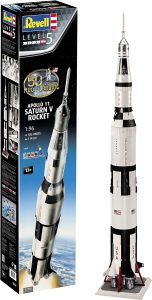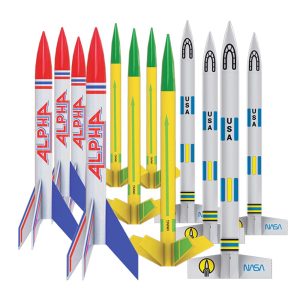Imagine if the thrill of launching a model rocket could ignite a passion for learning that extends far beyond the launchpad. Welcome to the world of model rocketry, where the excitement of exploration meets the rigor of scientific inquiry, a dynamic, hands-on approach that teaches valuable skills, fosters critical thinking, and inspires innovation.
Quick Links to Useful Sections
- STEM Foundations: The Science Behind Model Rockets
- Developing Essential Skills: Critical Thinking, Creativity, and Collaboration
- Real-World Applications: How Model Rockets Inspire Innovation
- community and Resources: Your Launchpad to Success
- Frequently Asked Questions: Your Model Rocketry Journey Begins
- Embark on Your Model Rocketry Journey Today
STEM Foundations: The Science Behind Model Rockets
At its core, model rocketry is an exercise in applied physics and engineering. By designing, building, and launching model rockets, enthusiasts of all ages develop a deep understanding of fundamental STEM concepts, including:
- Aerodynamics: The study of air resistance and its impact on rocket performance.
- Thermodynamics: The principles of heat transfer and energy conversion.
- Newton's Laws: The relationships between force, mass, and motion.
- Materials Science: The properties and applications of various materials in rocket construction.
As model rocketeers experiment with different designs, materials, and launch conditions, they develop problem-solving skills, analyze data, and refine their understanding of these critical STEM concepts.
Developing Essential Skills: Critical Thinking, Creativity, and Collaboration
The model rocketry experience extends beyond the realm of STEM, fostering essential skills that benefit individuals throughout their lives:
- Critical Thinking: Analyzing data, identifying patterns, and making informed decisions.
- Creativity: Designing innovative solutions, experimenting with new ideas, and pushing boundaries.
- Collaboration: Working together as a team, communicating effectively, and sharing knowledge.
- Resilience: Embracing failure, learning from mistakes, and persevering through challenges.
By engaging with model rocketry, individuals develop these vital skills, which translate to success in academics, careers, and personal pursuits.
Looking For The Best Model Rocket Kits? You'll Love These:
Real-World Applications: How Model Rockets Inspire Innovation
The principles and skills developed through model rocketry have far-reaching implications, influencing various aspects of our lives:
- Aerospace Engineering: Advancements in rocket technology, space exploration, and satellite development.
- Environmental Sustainability: Innovations in renewable energy, sustainable materials, and eco-friendly practices.
- Medical Breakthroughs: Applications of rocketry principles in medical research, device development, and patient care.
- Inspiring Future Generations: Fostering a love for STEM education, encouraging diverse perspectives, and promoting inclusivity in the pursuit of innovation.
The model rocketry experience serves as a catalyst, sparking curiosity, creativity, and innovation that can shape the future of various industries and aspects of our lives.
community and Resources: Your Launchpad to Success
Join a vibrant community of model rocket enthusiasts, educators, and innovators who share knowledge, resources, and inspiration:
- Online Forums and Groups: Connect with like-minded individuals, ask questions, and share experiences.
- Local Clubs and Meetups: Participate in hands-on activities, workshops, and launch events.
- Education and Training: Access tutorials, guides, and courses that cover various aspects of model rocketry.
- Competitions and Challenges: Engage in friendly competitions, design challenges, and innovation showcases.
Tap into this wealth of resources, and you'll find that the model rocketry community is dedicated to helping you succeed, learn, and grow.
Frequently Asked Questions: Your Model Rocketry Journey Begins
Here are some frequently asked questions that will help you get started on your model rocketry journey:
1. What is the best way to get started with model rocketry?
Begin with a starter kit, read tutorials, and join online forums to learn from experienced model rocketeers.
2. How do I ensure safety during launches?
Always follow safety guidelines, launch in open areas, and wear protective gear to minimize risks.
3. What are the different types of model rockets?
There are various types, including low-power, mid-power, and high-power rockets, each with its own unique characteristics and requirements.
4. How can I track my model rocket's flight?
Use tracking devices, altimeters, or GPS systems to monitor your rocket's altitude, speed, and trajectory.
5. Can I build my own model rocket from scratch?
Yes, with experience and knowledge, you can design and build custom model rockets using various materials and techniques.
Embark on Your Model Rocketry Journey Today
With its unique blend of STEM education, critical thinking, and innovation, model rocketry offers a fun and rewarding experience for enthusiasts of all ages. Whether you're a student, educator, or simply a curious individual, model rocketry has the power to inspire, educate, and empower.
So why wait? Join the model rocketry community, explore the vast resources available, and embark on a journey that will take you to new heights of learning, creativity, and innovation.
Looking For The Best Model Rocket Kits? You'll Love These:
Useful Interruption: Dive deeper into the world of Model Rockets with our most popular sections. If there is anything you think is missing or anything you would love for us to write about, just give us a shout.
- Getting Started & Basics With Model Rockets
- Model Rocket Design, Build & Customization
- Model Rocket Propulsion & Engine Technology
- Model Rocket Launch Techniques & Recovery
- Model Rocket Advanced Rocketry & Innovations
- Model Rocket DIY and Customization
- Model Rocket Equipment Reviews & Digital Tools
- Community, Competitions & Education
- Model Rocket Troubleshooting & FAQs
- Model Rocket Bonus/Seasonal & Niche Topics
A group of model rocket enthusiasts gathered at a field for their weekly launch event. Among them was Dave, a seasoned builder known for pushing the limits of hobby rocketry. This time, he had outdone himself.
“Ladies and gentlemen,” Dave announced, dramatically pulling a cloth off his latest creation, “I present to you: The Kraken!”
The crowd gasped. This wasn’t just a model rocket, it was a monster. The thing stood 8 feet tall, had six clustered engines, and was covered in enough duct tape to qualify as a classified aerospace project.
“Dave,” muttered Steve, the cautious safety officer, “Have you, uh… done the math on this?”
“Math?” Dave scoffed. “I built it in my garage at 3 a.m. with parts from eBay. This is an art piece, Steve.”
The countdown began.
5…
4…
3…
2…
1…
The engines ignited with a BOOM, and The Kraken shot up… kind of. It immediately did a violent barrel roll, narrowly missing the spectators before skyrocketing at an angle that could only be described as “legally questionable.”
The crowd collectively ducked as The Kraken flew straight over the adjacent cornfield, where Old Man Jenkins, the grumpiest farmer in town, was minding his business.
KABOOM!
The rocket disappeared behind the barn. A moment later, a flaming piece of Estes igniter wire landed at Steve’s feet. The silence was deafening.
And then, an unmistakable sound echoed across the field.
Jenkins’ shotgun being cocked.
“DAVE!!!” Steve shouted. “RUN.”
And that was the day Dave invented the first-ever biologically powered rocket booster: pure adrenaline.
To this day, nobody knows where The Kraken landed, but legend has it, it still haunts the skies, terrifying unsuspecting drones and low-flying birds.















